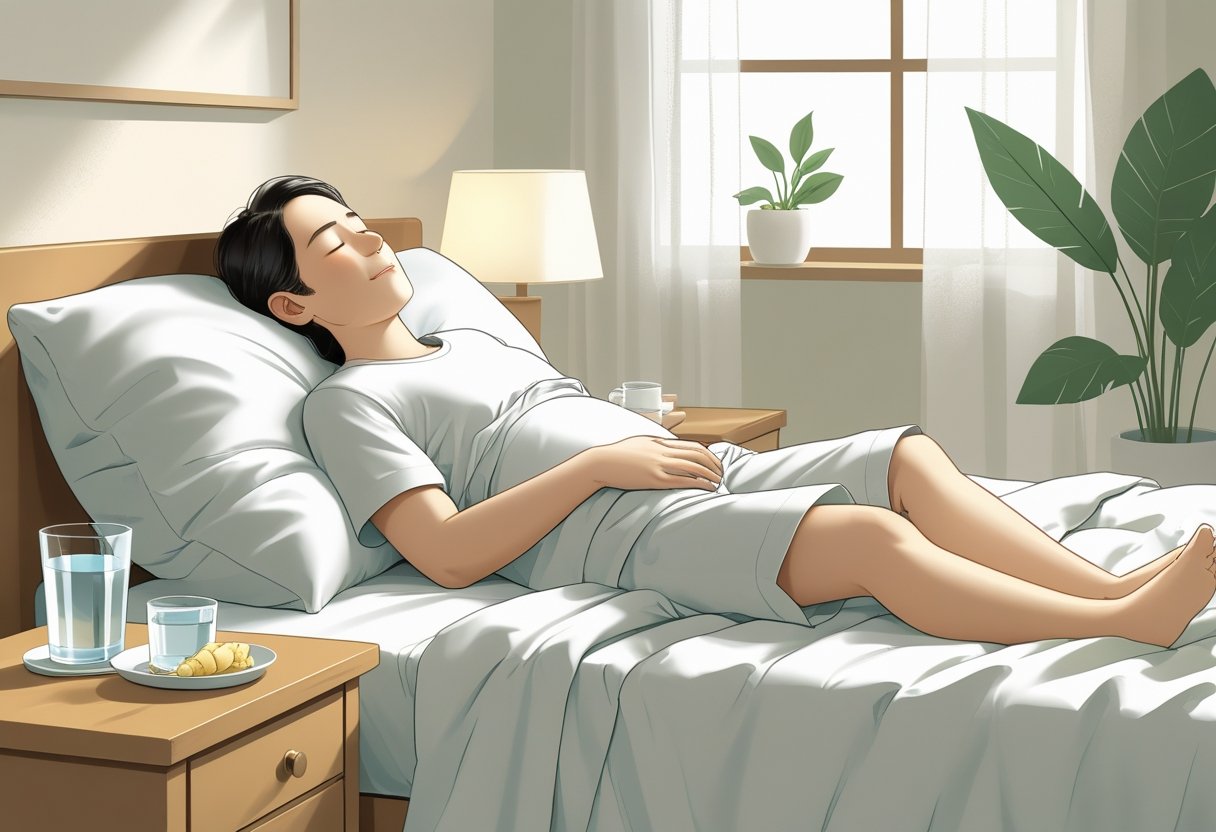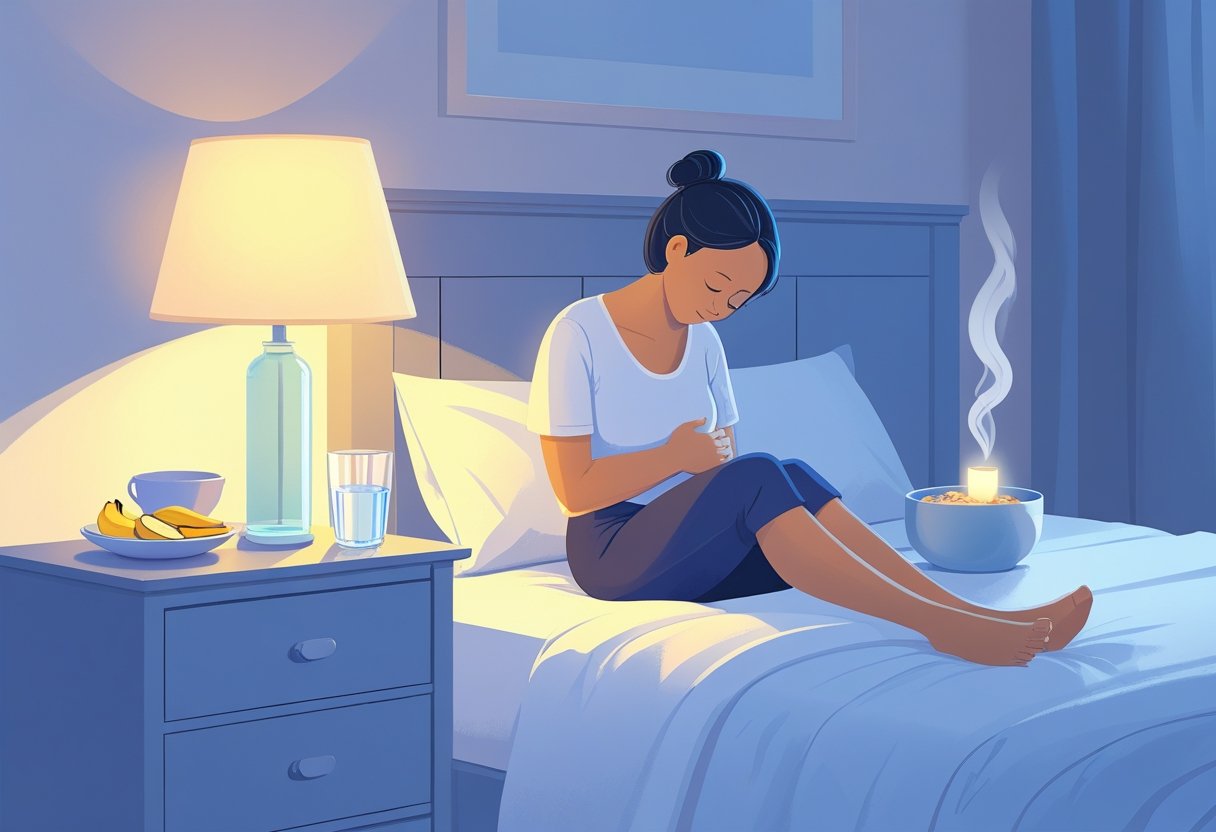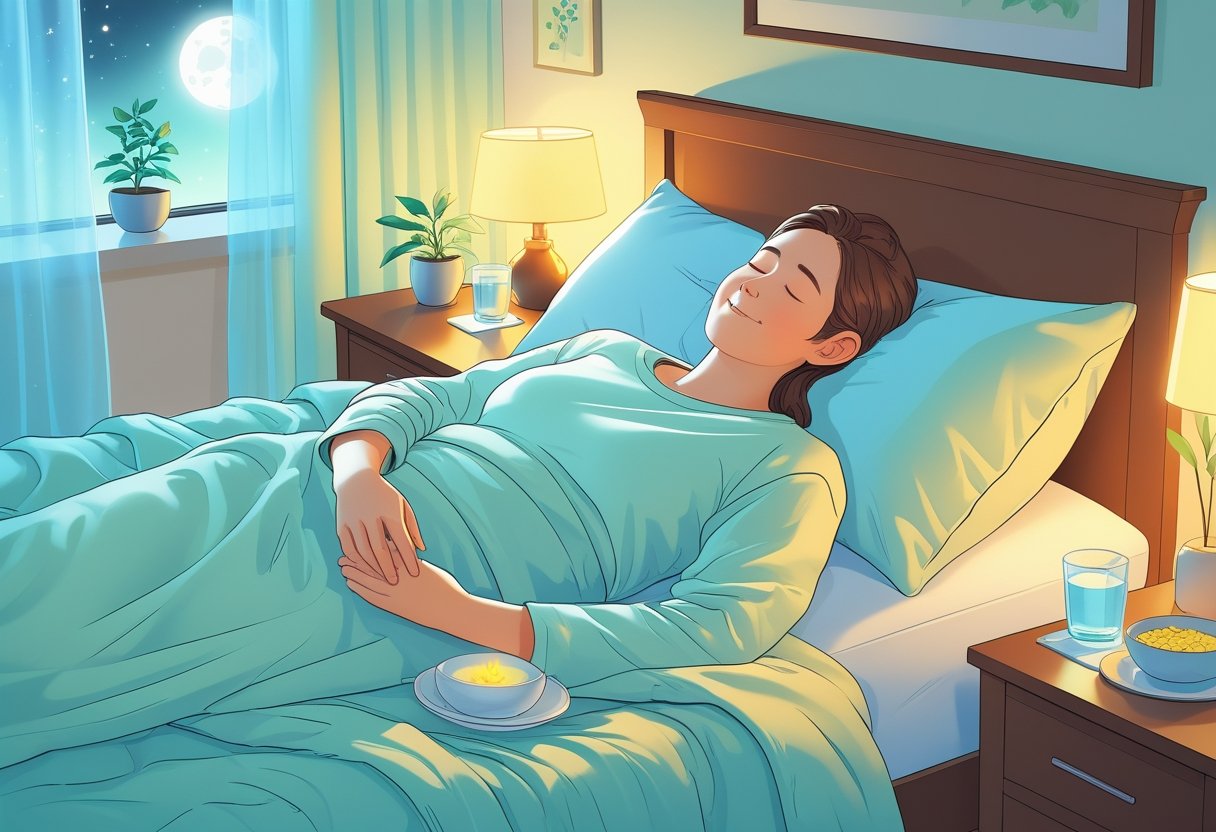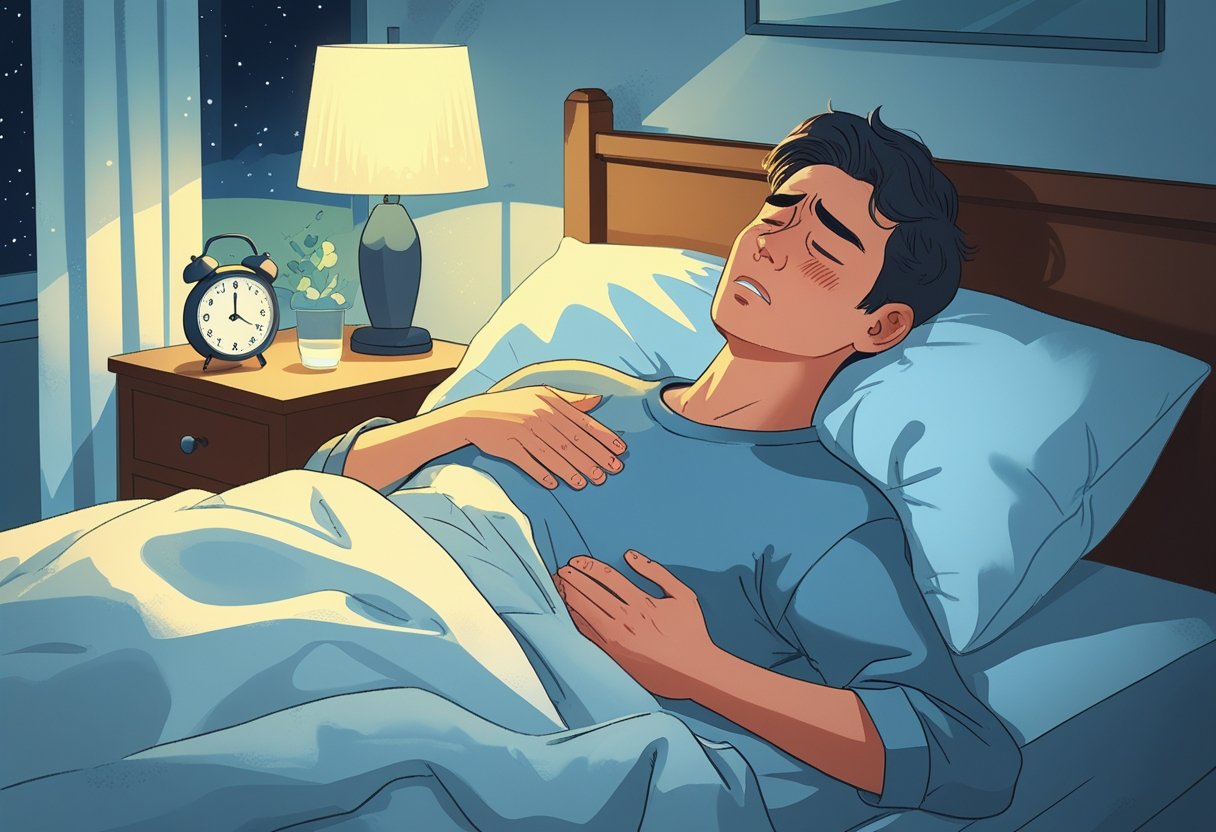Trying to sleep when your stomach is in knots is never easy. Diarrhea and cramps can wake you up, send you back and forth to the bathroom, and leave you restless. Lying on your left side often helps because it reduces pressure on your stomach and can make the pain a little easier to handle.
There are also a few small steps that may calm your system before bed. A warm cup of chamomile tea can relax your stomach, and drinking water keeps you from getting dehydrated. Skipping greasy or spicy foods at night is another way to avoid extra discomfort. Eating light in the evening means fewer problems once you’re in bed.
The main goal is to give your body the best chance to rest. Finding a comfortable sleeping position, staying hydrated, and using simple home remedies can make nights more manageable. But if the cramps don’t ease up or things get worse, it’s safer to talk to a doctor instead of pushing through.
Key Takeaways
- Sleeping on your left side can reduce stomach pain.
- Chamomile tea and drinking water may calm your stomach at night.
- Avoid foods that trigger stomach issues close to bedtime.
- A good mattress with balanced firmness can relieve pressure and support better rest.

Choosing the Optimal Sleeping Position

Identifying the best sleeping position can relieve stomach pain, gas, and discomfort due to diarrhea.
The way you sleep can make stomach problems feel better or worse. Some positions help digestion and ease pressure on the stomach, while others do the opposite. Finding the right position can reduce nausea and help you rest more comfortably.
Best Side to Sleep On for Digestion and Gas Relief
Sleeping on your left side is usually the best choice for digestion and gas relief. This position uses gravity to help food and waste move more smoothly through the intestines, which can ease stomach discomfort. It also helps reduce acid reflux, since stomach acid stays lower when you lie this way. People who deal with gas or bloating often find the left side works best for letting trapped air pass.
If you’re wondering which side supports digestion the most, the left side is the clear answer. On the other hand, lying on your stomach is not recommended since it puts strain on the neck and can add pressure to the belly.
Recommended Stomach Positions for Relief
For stomach pain, the left side remains the top option. It lessens pressure on the stomach and intestines and prevents acid from rising. If the left side causes discomfort in your shoulder or hip, lying on your back can be an alternative. Back sleeping keeps the spine aligned, though it may not be as effective for digestion. Sleeping on your stomach should be avoided, as it strains the spine and neck. To make side sleeping more comfortable, a pillow between the knees can help ease pressure on sore areas.
Finding the Best Sleep Position for Diarrhea
Diarrhea brings cramps and urgency, which makes sleep difficult. In this case, the left side is still the best position because it supports digestion and reduces stomach pressure. Curling slightly into a fetal position on the left can ease cramping in the abdomen. Propping the upper body at a slight angle may also help prevent nausea.
Lying on the back or right side is not ideal, as both can worsen symptoms by adding pressure or triggering acid reflux. Adjusting your sleeping position can go a long way in easing diarrhea discomfort through the night.
Nighttime Pain and Symptom Relief Strategies
Dealing with diarrhea at night can make it hard to rest, especially when abdominal pain is involved. Finding ways to ease cramps and relax the body can make a big difference in falling asleep. Simple care routines can help calm discomfort and improve the chances of getting proper rest, even while symptoms are ongoing.
Using Heat Therapy for Abdominal Comfort
Placing warmth on the stomach can help relax tight muscles and ease cramping. A heating pad or warm compress on the abdomen signals the muscles to loosen, which can lower pain. The key is to keep it warm, not too hot, so the skin doesn’t get irritated.
Heat therapy works best when used for about 15 to 20 minutes, especially before bed or during flare-ups. Wrapping the heat source in a cloth can prevent burns. Making this a part of the nighttime routine can help lessen stomach pain and make it easier to fall asleep.
Gentle Stretches and Relaxation Exercises
Gentle stretches, like the child’s pose, can release pressure in the lower stomach and back. This position allows the abdomen to expand slightly, which may support digestion and reduce cramps. Moving slowly while pairing stretches with deep breaths can also calm the body. Deep breathing helps lower stress and quiet the nervous system, which may reduce how strongly pain is felt. Taking a few minutes before bed to stretch and breathe can prepare the body for rest and ease discomfort that usually keeps sleep away.
The Importance of Proper Sleepwear and Bedding
What you wear to bed matters when the stomach feels sensitive. Loose, breathable fabrics like cotton are best since they don’t press against the abdomen or trap heat. Tight or synthetic clothing may worsen irritation and make it harder to relax.
The bedding also plays a role. A lighter blanket is often better than heavy covers, since overheating can increase discomfort. Keeping the path to the bathroom clear and easy to reach also helps reduce stress during the night. Creating a calm, comfortable sleep space gives the body a better chance to rest despite ongoing stomach issues.

Dietary Adjustments Before Bed
Some foods and drinks make diarrhea and stomach pain worse, especially at night. Caffeine and alcohol are common triggers. They can dehydrate the body and push the bowels to move faster, which adds to discomfort.
Foods to Avoid with Diarrhea and Stomach Pain
It’s also best to avoid spicy meals, greasy foods, and dairy. These can irritate the stomach, leading to more cramps or loose stools. Eating a heavy dinner close to bedtime can be tough on digestion too, so lighter meals are easier on the body. Sugary drinks and artificial sweeteners can also cause problems. They pull extra water into the intestines, which often leads to more diarrhea and bathroom trips.
Good Foods and Fluid Strategies
Gentle foods are easier for the stomach to handle. Bananas, rice, applesauce, and toast are safe options that give energy without causing more irritation.
Staying hydrated is key. Clear fluids like water, broth, or mild herbal teas help replace what’s lost from diarrhea. But it’s better not to drink too much right before bed, since that can interrupt sleep with bathroom visits. Ginger tea is another helpful choice. It can ease stomach discomfort and bring a calming effect. Sipping slowly in small amounts works better than drinking a lot at once. Probiotics can also support gut health, though they should be added carefully to see how the body reacts.

Creating a Restful Sleep Environment
A quiet and well-arranged sleeping environment can also minimize discomfort brought about by diarrhea and abdominal pain. Proper adjusting of temperature and bedding enables the body to unwind and sleep better in spite of symptoms.
Maintaining Room Comfort and Temperature
A calm and well-prepared room makes it easier to rest, especially if stomach pain or diarrhea keeps you uncomfortable. Keeping the space cool helps the body relax and settle into sleep. Most people sleep better when the room stays between 60 to 67°F (15–19°C). A cooler room helps the body lower its core temperature, which makes falling asleep easier.
Light and noise should be kept low. Blackout curtains or an eye mask can block unwanted light, while earplugs or a white noise machine can soften loud or sudden sounds. Fresh air also makes a difference, so opening a window or using a fan can add comfort during the night.
Wearing loose clothes made from breathable fabrics like cotton prevents extra pressure on the stomach and keeps the skin dry. This avoids irritation and makes lying down less stressful on the body.
Setting Up Supportive Bedding and Pillows
Choosing the right bedding can ease discomfort and help the body rest. Lightweight blankets and soft sheets reduce the chance of overheating and stop the skin from feeling itchy or sticky. Comfort comes from keeping things simple and cool.
Pillows play a big role in support. A wedge pillow can lift the upper body slightly, which takes pressure off the stomach and lowers the risk of acid reflux. Lying on your back with a pillow under the knees also helps release tension in the lower abdomen. For side sleepers, placing a firm pillow between the knees keeps the hips even and avoids strain. The main idea is to stay supported in a position that feels good while not pressing on the stomach. With the right setup, sleep becomes easier even with discomfort.

When to Seek Medical Advice

Sometimes stomach issues are just temporary, but other times they need a doctor’s attention. Diarrhea and abdominal pain improve on their own, yet persistent or severe symptoms should not be ignored. Knowing the signs helps you decide when to get medical help.
Warning Signs of Severe or Persistent Symptoms
If diarrhea lasts more than two days, it’s wise to check in with a doctor. High fever over 102°F, strong cramps in the belly or rectum, or stool with blood or pus are serious signs and need immediate care.
Dehydration is another signal to act fast. Watch for dry mouth, dark urine, dizziness, or feeling very weak. Diarrhea that continues for more than three days or black, sticky stools also need a doctor’s evaluation. Young children, infants, and older adults are at higher risk. Infants with diarrhea for over a day or showing dehydration signs should be seen right away.
Advisory Tips for Controlling Nocturnal Diarrhea
Nighttime diarrhea can interrupt sleep and worsen belly pain. Keeping a bathroom nearby helps reduce stress and frequent trips. Avoid heavy, fatty, or spicy meals before bed, as they can trigger nighttime symptoms. Relaxation techniques like slow breathing or meditation may help calm stress, which can make diarrhea worse.
If these night symptoms continue, it’s important to see a healthcare provider. They can check for infections, allergies, or chronic issues that might be causing the problem. Proper care can reduce discomfort and help you rest better.
Best Mattress Support for Sleeping Through Stomach Discomfort
In addressing diarrhea and abdominal pain, mattress support is a large part of improved sleep. A mattress that is too soft can let your body sink too much, which adds pressure to your abdomen and can make discomfort worse. On the other hand, a mattress with steady, even support keeps your body aligned and eases pressure on sensitive areas.
Stomach sleepers especially need a mattress that doesn’t sag under the hips and torso. Zoned support mattresses can help with this. They usually have firmer zones under the stomach and softer zones under the shoulders and legs, keeping the spine in line and reducing pressure. The feel of the mattress surface also matters. A responsive top allows you to turn over easily on restless nights. Hybrid mattresses that mix foam and springs often balance firmness and bounce well.
A mattress worth considering is the Brooklyn Bedding Signature Hybrid. It comes with zoned support and firmness options—Soft, Medium, and Firm—to help keep your body aligned and relieve pressure, which can be useful for stomach discomfort. The Brooklyn Bedding Signature Hybrid also has a breathable cover and an advanced coil system that improves airflow. This helps keep you cool at night, which is important if stomach issues cause night sweats or discomfort. Its durable construction provides consistent support, so sagging or uneven wear is less of a concern.
Find these essential mattress features:
- Firmness: Medium-firm to firm (around 6 to 8 out of 10) works best.
- Pressure relief: Supports your body evenly without creating new pressure points.
- Breathability: Helps reduce heat buildup that can worsen discomfort.
- Durability: Keeps stable support over time for long-lasting comfort.
Choosing a mattress with these features can make it easier to sleep even when dealing with stomach cramps or digestive problems.

Frequently Asked Questions
Managing symptoms makes it easier to sleep with diarrhea and stomach pain. Simple changes in sleep position, diet, and relaxation can reduce discomfort at night.







